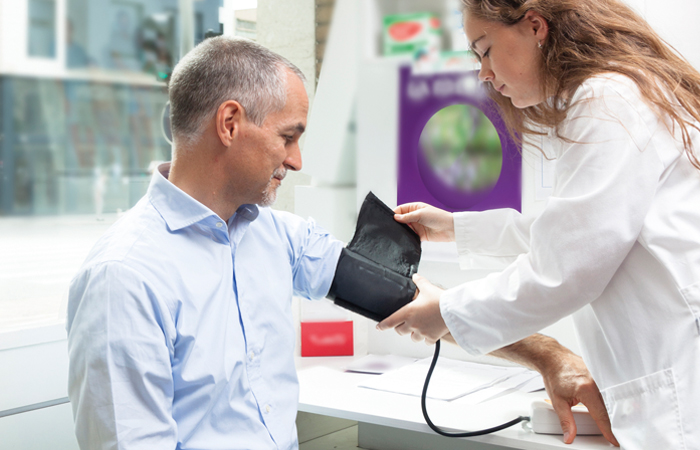Briefing: Pharmacy BP checks a lifeline
In Clinical
Follow this topic
Bookmark
Record learning outcomes

Stress levels have risen in the population during the pandemic. As a result, screening for raised blood pressure in community pharmacies is more important than ever, writes PM clinical editor Mark Greener
Since 2017 the International Society for Hypertension (ISH) has run May Measurement Month (MMM) as an annual global screening campaign to raise awareness of the importance of measuring blood pressure. Due to the Covid-19 pandemic, the ISH cancelled last year’s MMM but has extended it to run between May 1 and November 30 this year.
Until about the 1950s, doctors could do little more than suggest patients with hypertension followed the advice they offered Franklin D Roosevelt, whose blood pressure rose steadily during his presidency: rest, take phenobarbital and eat a low-fat and low-sodium diet. Despite receiving the best care available at the time, Roosevelt died from a cerebral haemorrhage aged just 63 years.
The introduction of orally active diuretics in the late 1950s and beta-blockers in the 1960s transformed hypertension care. Today, doctors use a wide range of antihypertensives, often combined, which dramatically improve prognosis. For example, lowering systolic blood pressure (SBP) by 10mmHg or diastolic blood pressure (DBP) by 5mmHg reduces the relative risk of all major cardiovascular disease events by about 20 per cent.
Common problem
Despite therapeutic advances and numerous public health campaigns promoting a healthy lifestyle, hypertension remains common. According to the British Heart Foundation, about a quarter of adults in the UK – some 14.4 million people – have hypertension. Yet GPs have diagnosed hypertension in only about nine million of these patients.
The Health Survey for England 2019 defined untreated hypertension as SBP of at least 140mmHg, DBP of at least 90mmHg or both in people who are not taking antihypertensives. Based on this definition, 14 per cent of men and 11 per cent of women had untreated hypertension. In men and women the proportions were highest in people aged 55 to 64 years (22 per cent) and at least 65 years (19 per cent) respectively.
Despite the wide array of antihypertensives available, treating hypertension often remains difficult. For instance, up to half of patients become partially or fully non-adherent within a year of starting antihypertensives. People may not adhere fully because they experience side-effects and, as hypertension is typically asymptomatic, they may also feel that the treatment doesn’t offer any benefits.
Treatment resistance
About 10 per cent of people receiving anti- hypertensives are treatment resistant and do not reach their target blood pressure despite adhering to a combination of drugs from three antihypertensive classes at the highest tolerated doses. Older men of black African ethnicity and people with certain comorbidities, such as chronic renal disease and other cardiovascular conditions, are most likely to show treatment- resistant hypertension.
Several factors drive treatment resistance. For instance, current antihypertensives do not target all the pathways responsible for raised blood pressure. Antihypertensives may also stimulate counter-regulatory mechanisms so their effects may decline over time.
Clearly, we need to do more to identify and treat people with hypertension. With the annual global screening campaign to raise awareness of the importance of measuring blood pressure running from May to the end of November this year, the aim is to measure the blood pressure of more than one million people in 85 countries.
Get involved
As part of this global approach, the ISH is encouraging community pharmacists across the UK to participate in MMM. “The role of community pharmacists providing front-line care for patients has increased,” Neil Poulter, professor of preventive cardiovascular medicine at Imperial College London and MMM chief investigator told Pharmacy Magazine.
“Hitherto, pharmacists have played a key role in the management of hypertension by dispensing blood pressure-lowering agents, discussing side-effects and in some situations measuring blood pressure.”
Social distancing and pressure on the health service because of the pandemic can mean routine and opportunistic blood pressure screening falls by the wayside – so community pharmacists will be especially valued this year.
“Under the current circumstances, screening for raised blood pressure in the community becomes an even more important activity for pharmacy teams,” Professor Poulter concludes. “Where capacity allows, we would be thrilled to have as many pharmacists as possible take part in the 2021 MMM campaign.”
• Community pharmacists can find toolkits, guidance and other resources on the MMM website and can contact MMM via harsha@maymeasure.org. References available from the editor on request.
